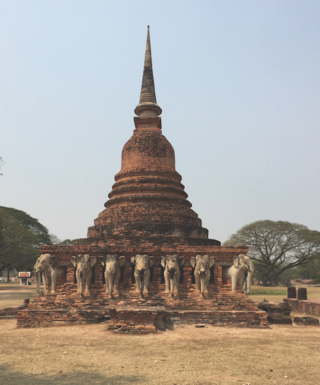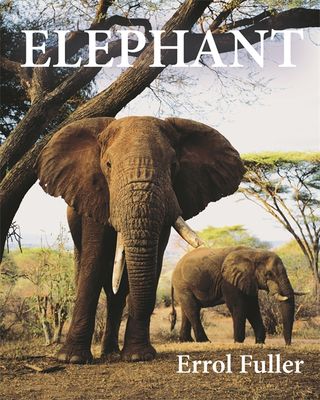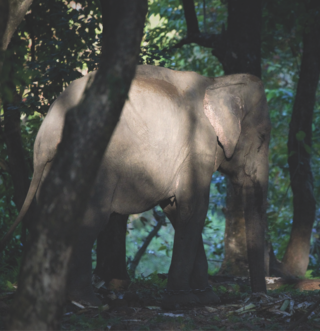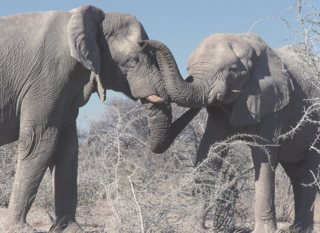Attention
Elephant: A Groundbreaking Book On Majestic Giants
An interview with Errol Fuller, writer, painter, and authority on extinction.
Posted August 17, 2019
"My own view is also that the various new laws being introduced in the western world to prevent ivory trafficking are for the most part useless and entirely miss the point. They are just sops to the general public to make people think that governments are doing something to eradicate ivory poaching when the problem in modern times is exclusively one for the Far East."
I just received, read, and couldn't put down a new book filled with important text and evocative and newly published images called Elephant by writer, painter, and world authority on animal extinction, Errol Fuller. Part of the book's description reads, "A lavishly illustrated celebration of these glorious animals―and a poignant lament for their future...Errol Fuller provides a rich and moving portrait of elephants, exploring their natural history, the legends that have grown up around them, their unique place in art and literature, and their urgent need for protection today." I wanted to know more about his latest magnificent book, and I was thrilled Mr. Fuller could take the time to answer a few questions. Here's what he had to say.

Why did you write Elephant?
Elephants have always been a great interest of mine. I felt that with elephant problems being so much in the forefront of current media and legislative activity, this was the time to help promote an elephant agenda. There are many, many books on elephants but the vast majority of these are very specific in their approach. They have titles like 'My 12 years with elephants in Botswana' or 'The Leader of the Pack: The study of a Bull Elephant.' Such books are all perfectly good in their way but none seemed to me to give an overall picture of elephants. And that is what I wanted to do.

My own view is also that the various new laws being introduced in the western world to prevent ivory trafficking are for the most part useless and entirely miss the point. They are just sops to the general public to make people think that governments are doing something to eradicate ivory poaching when the problem in modern times is exclusively one for the Far East. All the legislation in the western world will make no difference because in real trade terms there is no longer any real requirement or desire for new ivory. So I believe efforts and expenditure should be focused on where it will make a difference, the Far East and Africa itself. My belief is that realistic activity will only come about by putting the spotlight on what wonderful creatures elephants are, and making people feel personally engaged with them, rather than just letting the general public think that irrelevant legislation is achieving something positive.
So that was my general feeling about creating this book; show elephants in all their wonder, and let people see them for what they are, magnificent, highly intelligent animals that are so like us in many respects but which have been abused by humans throughout history in many, many ways.

How does it follow up on some of your previous interests and work?
My interests have generally focused on art and the curiosities of natural history and these subjects have always been the subject matter for my books. In terms of natural history Elephants sort of follows on from my other books, most of which are about extinct creatures or those that are rare or endangered.
What are some of your main messages?
My main message is that there are many incredibly interesting things in the world and we should look after them instead of abusing what is around us. I suppose I think that by drawing attention to these fascinating things it might help to stop (or at least slow down) the rate at which we destroy them. My books on extinct birds obviously show what can so easily happen.

Who is your intended audience?
I have always intended that my books should be attractive and accessible to anyone who thinks they may be interested in the subject matter. I despise books that are written in terms that are intended for people who already know about the subject matter (or think they do) and are incomprehensible to the general public.
What are some of your current projects?
I have just finished a book on Lyme Regis and its fossils. I should point out that this small town on the Dorset coast in southern England was virtually the birthplace of palaeontology and fossil hunting. My next project is a book on art, The Heyday of Bourgeois Mediocrity. It will be about the inferiority and irrelevance of much modern painting and video art. Its theme is essentially that once upon a time 'art' represented the highest achievement to which a society could aspire. This is no longer the case and it is largely irrelevant. Now the idea of 'art' has been sidelined and has been entirely overtaken by so many other fields of activity. Even the body shell of a Chrysler vehicle has more art in it than the vast majority of pieces of work in contemporary galleries.
______
Thank you so much, Errol. Elephant truly is a remarkable work, replete with deeply moving and highly informative images and text. In an increasingly human-dominated world, these intelligent, sentient, social, and beleaguered giants need all the support they can get, and your groundbreaking book is just what is needed to help them along. Like your other books, Elephant calls attention to remarkable animals with whom we share our magnificent planet and who also could be gone in a heartbeat. I hope it enjoys a broad global audience, because you are correct when you write it's all to easy to lose other animals and we don't miss them until they're gone.


